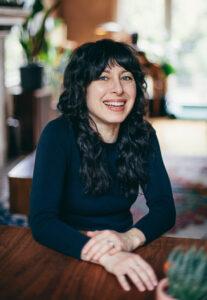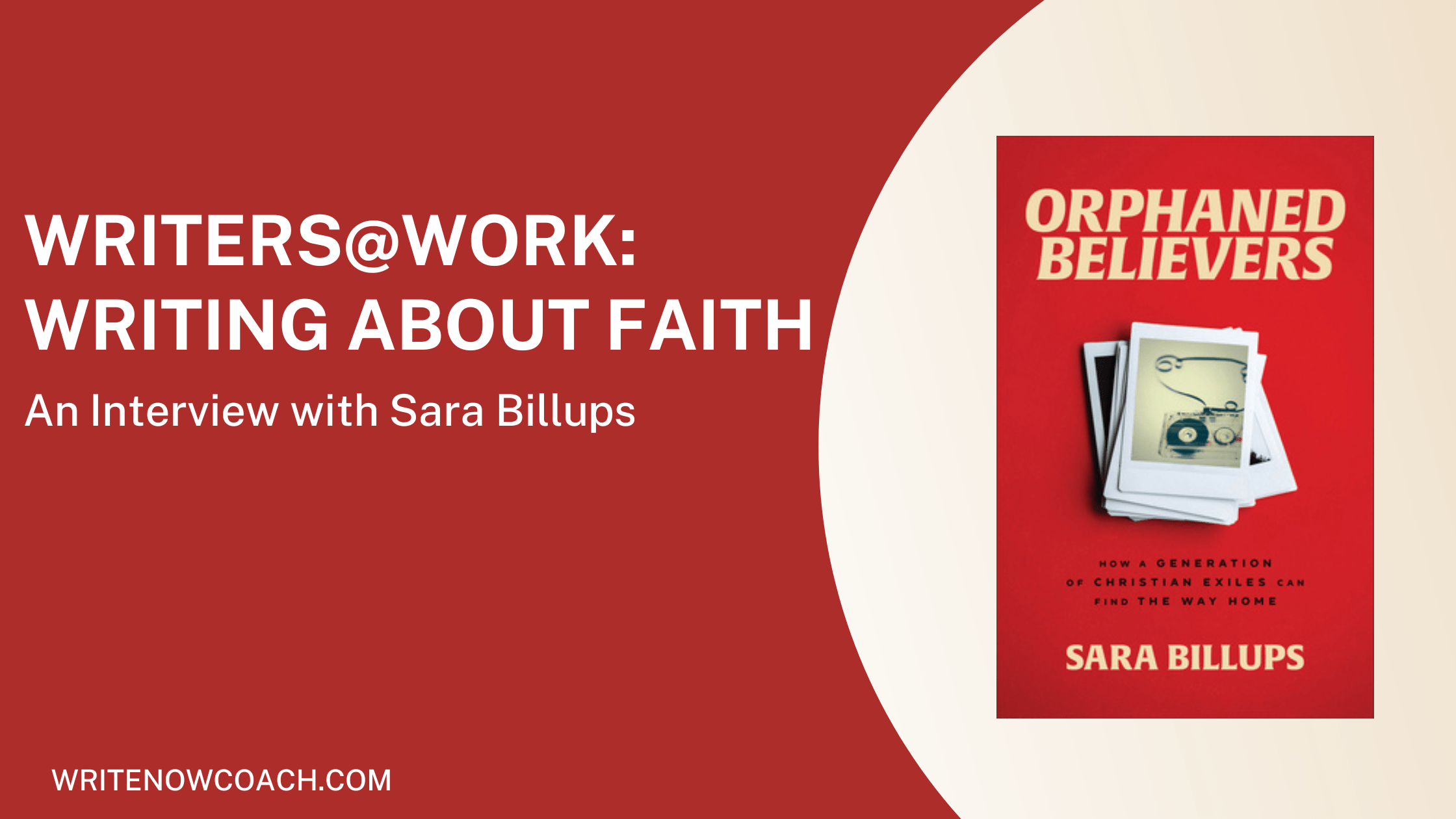Writers@Work: An Interview with Sara Billups
January 31, 2023
Note From Rochelle
Dear Writers,
I am planning my workshops and offerings for the next six months and would love your input. I want to offer classes that answer your needs. Everyone who fills out the survey will be entered into a drawing to win a complementary coaching session with me. Here’s the link: https://forms.gle/Vwd6syJTAQ4sKQqB9
In today’s post, I interview Sara Billups about her new book Orphaned Believers.
Happy writing,
Rochelle, the Write Now! Coach
Writers@Work: Writing about Faith
An Interview with Sara Billups
Can you tell us about your new book, Orphaned Believers.
My first book, Orphaned Believers, follows the journey of a generation raised in the 80s and 90s of evangelicalism reckoning with the tradition that raised them and searching for a new way to participate in the story of God. I approached the book journalistically, with research on end times culture, single-issue voting, the suburbs, and consumerism. But there’s a strong narrative non-fiction thread telling the story of growing up with my dad.
Can you talk about the process of writing the book? Did you run into any challenges writing your personal story and staying connected to your family?
It surprised me how physical writing the book was. I’d research for an hour, write a few paragraphs, and lay down on the rug next to my desk and sleep. There were some ideas and connections I didn’t know if I could make, it was stretching. The parts about my family were quite different — those sections flew right out, they came in a rare writing season when the narrative threaded together without knowing what had happened. I still can’t explain it.
I write critically about my father’s rapture obsession and trace his story back to larger threads experienced by a lot of his white Boomer evangelical peers coming out of the Vietnam era into the Jesus People Movement in the 70s and Reaganomics in the 80s. But I also tried to be tender and nuanced when I write about my family. Most of us who have kids love them the best we can, and even though I was raised being told the world would end before I had a family of my own or started a career, my parents also raised me with a lot of love. My mom and dad are reading the book to each other out loud together now and talking about their reactions and what it’s bringing up for them has led to a lot of healing between us.
What was your journey like to publication?
I started working with The World’s Best Agent ™ John Blase at The Bindery in February of 2021. John reached out when he was building a client list after a friend sent an essay I’d published. The first thing he said on our first call was “if we start working together and you meet an agent you think would do a better job, I want you to feel free to work with them.” That kind of open-handed trust has become reciprocal and makes it a gift to work together.
I’d been tossing around a few sample chapters and trying to piece together a book proposal since the summer before I started working with John. I was concerned that my 1,351 Instagram followers (a number burned in my mind) would not come anywhere close to what I needed for a book deal. I’d poked around the websites of literary agents and listened to all sorts of podcasts on book deals and knew the drill: Don’t call it memoir, call it narrative non-fiction. And unless you’re writing fiction, you need 10,000 followers. Not 10,000 combined. 10,000 on a single platform. Maybe 20,000. It was all so discouraging and a traditional deal felt out of reach.
We started pitching out in late spring of 2021 anyways, and in the meantime I found a way to slowly grow a platform on Instagram that “felt” like enneagram 4 me. After a short stack of rejections (all with the same feedback: strong idea and writing, small platform) we ended up with a couple of offers that summer from editors who really got the vision for the book. I leapt at the chance to work with Stephanie Duncan Smith at Baker.
You are pursuing a DMin and writing and doing life—how do you make time to write?
The DMin (my kids howl with laughter anytime I say “mom’s getting a demon”) is very much centered on two things I’d be doing anyway: reading and writing. To finish the program, I have to produce the equivalent of half a book. Everyone says the best thing to do when you publish a first book is to start working on something else right away, and the program keeps me busy but is also really good timing. I have about three chapters drafted towards something new and am looking forward to diving in this spring.
It’s a low-residency program, with two in-person weeks a year together. Writing is perfect for … loners, introverts, and the at least mildly cerebral, but I can’t tell you how cool it’s been growing a new community of writer friends. I’m confident that many of these connections will be a lifelong thing.
What are you reading now?
- Therese of Avila’s, The Autobiography of St. Teresa of Avila
- Eudora Welty, One Writer’s Beginnings
- Mary Karr, The Art of Memoir
- Sophronia Scott, The Seeker and the Monk
- Bono, Surrender (the audiobook is really good)
- Everything Sad Is Untrue, Daniel Nayeri
- The Crane Wife: A Memoir in Essays, C.J. Hauser
- Doing Nothing Is No Longer an Option: One Woman’s Journey Into Everyday Antiracism, Jenny Booth Potter
 About the author. Sara Billups is a Seattle-based writer and cultural commentator whose work has appeared in the New York Times, Christianity Today, Ekstasis, and others. Sara writes Bitter Scroll, a monthly Substack letter. She is completing her Doctor of Ministry in the Sacred Art of Writing at the Peterson Center for the Christian Imagination at Western Theological Seminary.
About the author. Sara Billups is a Seattle-based writer and cultural commentator whose work has appeared in the New York Times, Christianity Today, Ekstasis, and others. Sara writes Bitter Scroll, a monthly Substack letter. She is completing her Doctor of Ministry in the Sacred Art of Writing at the Peterson Center for the Christian Imagination at Western Theological Seminary.
Sara works to help wavering Christians remain steadfast through cultural storms and continues to hope for the flourishing of the Church amid deep political and cultural division in America.









